Business Insider reported that Oracle introduced its Blockchain Cloud Service on October 2nd, as the company is making steps to outcompete giants like Microsoft and IBM.
Obviously, the new cloud service will be used for sharing data in a more secure way. While the service will be made available to users later this year, Oracle was one of the companies that joined the Hyperledger Project in the summer. Hyperledger Project is an open source that aims to advance blockchain disruption and innovations across industries. The next big disruption may happen in the business-to-business environment, in which many companies have tried to gain share and develop some innovative edge to compete with the fast-paced blockchain environment.
Some of the industries that have already been disrupted by blockchain include not only financial institutions, but also the agriculture, real estate and healthcare industries.
Business Insider gathered valuable insights on how the big players in the cloud industry compete with each other and what services they offer that integrate blockchain for the benefit of their users:
“Microsoft Azure launched its blockchain-as-a-service (BaaS) offering in November 2015 and has since been steadily rolling out related services, including Enterprise Smart Contracts, which launched in July 2017.
IBM rolled out its BaaS offering in March 2017 following an announcement the previous April. In September, the company was named the global leader in blockchain technology by Juniper Research.
SAP currently offers BaaS via an early access program for IT services providers and IT companies. By mid 2018, the company plans to make the technology more generally available.”
The conclusion from Oracle’s move to launch its own blockchain cloud service speaks volumes for the fact that the biggest industry players are constantly battling for market share and racing towards grabbing some of the blockchain boom, which is expected to contribute total value for business across multiple industries of $176 billion up until 2030, as estimated by Gartner and reported by Business Insider.
